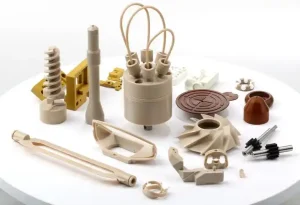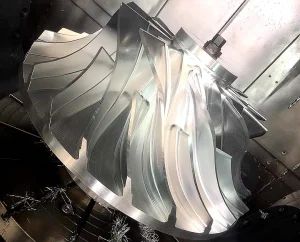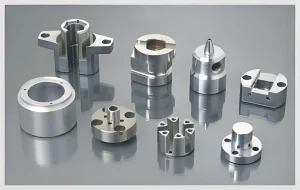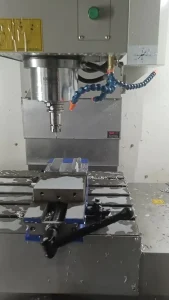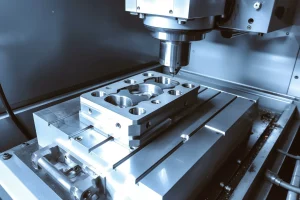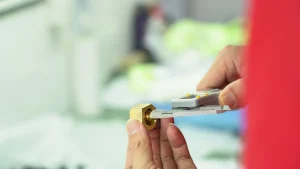Introduction
In the modern manufacturing landscape, precision CNC machining technology stands as a cornerstone for creating high-quality parts. It has revolutionized the way industries fabricate components, enabling unprecedented levels of accuracy, repeatability, and efficiency. From the intricate parts of aerospace engines to the delicate components in medical devices, CNC machining plays a pivotal role in bringing designs to life with utmost precision. In this article, we will explore the ins and outs of precision CNC machining technology and how it paves the way for manufacturing excellence, with a special focus on the value rapidefficient brings to the CNC machining market.
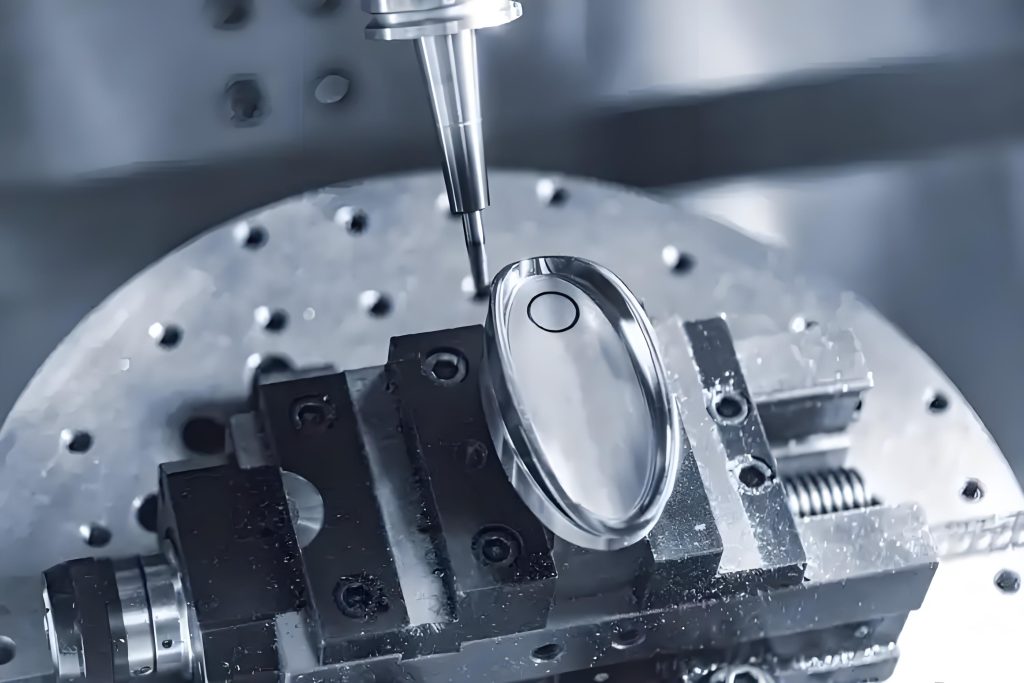
What is Precision CNC Machining Technology?
Precision CNC machining technology refers to the use of computer numerical control systems to automate machine tools in the manufacturing process. It allows for highly accurate and repeatable production of parts with tight tolerances. Essentially, it replaces the manual control of traditional machining with computerized commands, ensuring each cut, drill, and grind is executed precisely as programmed.
At the heart of this technology is the CNC controller, which interprets digital design data and converts it into precise movements of the machine’s cutting tools. This controller reads a set of coded instructions, known as G-code, that dictates every aspect of the machining operation, from toolpaths to spindle speeds. The CNC machine then executes these commands with minimal human intervention, reducing errors and increasing productivity.
Compared to traditional machining methods, precision CNC machining offers several advantages. Firstly, it provides much higher accuracy, often reaching micron or even sub-micron levels. This level of precision is crucial in industries like aerospace and medical, where even the slightest deviation can have significant consequences. Secondly, it boosts efficiency as machines can operate continuously, 24/7, with minimal downtime between jobs. Additionally, the ability to quickly switch between different programs makes it ideal for small-batch and custom production runs. Lastly, CNC machining offers enhanced flexibility. By simply changing the program, manufacturers can produce a wide variety of parts with different geometries and specifications, without the need for extensive retooling.
Key Features and Advantages
High Precision
One of the most remarkable features of precision CNC machining is its ability to achieve extremely high precision. In industries such as aerospace and medical, where components demand micron or even nanometer-level accuracy, CNC machines truly shine. For example, in aerospace, turbine blades and engine components require precise geometries to ensure optimal performance and safety. CNC machining can fabricate these parts with tolerances as tight as a few microns, guaranteeing that each blade fits perfectly and functions efficiently. Similarly, in the medical field, implants and surgical instruments need to be highly precise to interact flawlessly with the human body. CNC technology enables the production of implants with intricate surface finishes and accurate dimensions, reducing the risk of rejection and improving patient outcomes.
High Efficiency
Efficiency is another hallmark of precision CNC machining. These machines can operate continuously, 24/7, with minimal downtime between jobs. The automated nature of CNC machining eliminates the need for manual adjustments and reduces human error. In the automotive industry, where large volumes of parts are required, CNC machines can produce components like engine blocks and transmission parts at a rapid pace. They can quickly switch between different programs, making them ideal for multi-variety, small-batch production. For instance, a car manufacturer may need to produce different versions of a particular component for various models. CNC machines can swiftly adapt to these changes, reducing production time and costs. Additionally, the high cutting speeds and feeds achievable with CNC technology further enhance productivity, allowing manufacturers to meet tight deadlines and market demands.
High Flexibility
The flexibility of precision CNC machining sets it apart from many traditional manufacturing methods. By simply changing the program, these machines can produce a vast array of parts with different shapes, sizes, and specifications. This adaptability is crucial in today’s fast-paced market, where product designs are constantly evolving. In the electronics industry, for example, the demand for unique and complex-shaped casings for smartphones, tablets, and other devices is ever-present. CNC machining can effortlessly create these intricate designs, accommodating features like cutouts, grooves, and curvatures. Whether it’s a small batch of prototype casings or a large production run, CNC machines can adjust to the requirements, saving time and resources compared to using specialized tooling for each new design. This flexibility also extends to material selection, as CNC machines can handle a wide range of materials, from metals like aluminum, steel, and titanium to plastics and composites.
Application Areas
Automotive Industry
The automotive industry is one of the largest beneficiaries of precision CNC machining technology. From engine components to transmission parts and chassis elements, CNC machining ensures the high quality and reliability of vehicles. For example, engine blocks, which are the heart of automobiles, require complex machining processes to achieve precise internal passages and mating surfaces. CNC machines can fabricate these with the utmost accuracy, optimizing engine performance and fuel efficiency. Gearboxes, too, demand tight tolerances to ensure smooth gear meshing and minimal power loss. CNC machining enables the production of gears with precisely cut teeth and accurate profiles, enhancing the overall drivability and longevity of the vehicle. Additionally, with the growing trend of lightweighting in automotive design, CNC machining plays a crucial role in manufacturing components from lightweight alloys such as aluminum and magnesium, helping to reduce vehicle weight while maintaining structural integrity.
Aerospace Field
In the aerospace sector, precision is not a luxury but an absolute necessity. The components used in aircraft and spacecraft must withstand extreme conditions and perform flawlessly. CNC machining is employed to produce critical parts like turbine blades, which operate under high temperatures and stresses. These blades need to have precise aerodynamic profiles to maximize engine efficiency and thrust. CNC technology allows for the creation of complex blade geometries with minimal surface roughness, ensuring optimal airflow and performance. Another example is the machining of fuselage and wing structures. These components require high strength and low weight, and CNC machining can fabricate them from advanced materials like titanium alloys and composites with pinpoint accuracy. The ability to meet stringent aerospace standards, such as those set by FAA and EASA, makes CNC machining indispensable in this industry. Any deviation in the machining of aerospace parts could lead to catastrophic consequences, highlighting the importance of the precision and reliability it offers.
Medical Device Manufacturing
Medical device manufacturing demands the highest levels of precision and quality control. From implants that replace damaged body parts to surgical instruments that perform delicate procedures, every component must be flawless. For instance, artificial joints, such as hip and knee replacements, need to fit perfectly within the human body to provide long-term functionality and minimize the risk of rejection. CNC machining can produce these implants with ultra-precise dimensions and smooth surface finishes, mimicking the natural contours of the bones. Dental implants, too, require microscopic accuracy to integrate seamlessly with the jawbone. CNC technology enables the fabrication of implants with intricate thread patterns and precise diameters. Surgical instruments like scalpels and forceps also benefit from CNC machining, as they can be made with sharp edges and fine tips, ensuring precise incisions and minimal tissue damage during surgeries. The biocompatibility of materials used in medical devices is also enhanced through precise machining, as it reduces surface irregularities that could potentially cause adverse reactions in the body.
The Value of Rapidefficient in the CNC Machining Market
In the highly competitive CNC machining market, rapidefficient has emerged as a game-changer. It offers a unique blend of speed, quality, and cost-effectiveness that sets it apart from the competition.
When it comes to speed, rapidefficient utilizes state-of-the-art CNC machines and optimized machining processes. These machines are equipped with high-speed spindles and advanced tooling systems, enabling them to perform cutting operations at remarkable speeds. For example, in a production run of aluminum parts for the electronics industry, rapidefficient’s machines can complete the machining of a batch in significantly less time compared to traditional methods. This rapid turnaround time allows manufacturers to meet tight deadlines and respond quickly to market demands.
Quality is another area where rapidefficient excels. Their team of highly skilled engineers and technicians meticulously calibrate and monitor the machining processes. Advanced inspection equipment, such as coordinate measuring machines (CMMs), is used to ensure that each part meets the strictest quality standards. In the aerospace industry, where precision is non-negotiable, rapidefficient has consistently delivered components with zero defects, earning them a reputation for reliability.
Cost-effectiveness is a key advantage that rapidefficient brings to the table. By optimizing production processes, minimizing material waste, and reducing setup times, they are able to offer competitive pricing to their clients. For instance, in the automotive sector, where cost control is crucial, rapidefficient’s machining services have helped manufacturers save significant amounts on production costs without compromising on quality.
One notable success story is a leading medical device manufacturer that was facing challenges in producing high-precision implants. Rapidefficient stepped in and redesigned the machining process, implementing advanced CNC techniques. As a result, the production time was reduced by 30%, and the quality of the implants improved, leading to higher patient satisfaction and increased market share for the client. Another example is a startup in the electronics field that needed rapid prototyping of custom parts. Rapidefficient’s quick response and efficient machining capabilities enabled the startup to bring their product to market in record time, giving them a competitive edge.
In conclusion, rapidefficient’s value in the CNC machining market lies in its ability to offer rapid production, impeccable quality, and cost savings, making it the go-to choice for industries seeking to stay ahead in today’s fast-paced manufacturing landscape.
How to Choose a Reliable CNC Machining Service Provider
When seeking a CNC machining service provider, several key factors should be considered to ensure the highest quality parts and a smooth production process.
Firstly, the sophistication of the equipment matters. A reliable provider should have state-of-the-art CNC machines equipped with advanced features such as high-speed spindles, multi-axis capabilities, and automatic tool changers. These features not only enhance precision and efficiency but also enable the machining of complex geometries. For example, 5-axis CNC machines can produce parts with undercuts and intricate contours in a single setup, reducing errors and production time.
Secondly, the expertise of the technical team is crucial. The machinists and engineers should possess extensive knowledge and experience in CNC machining. They should be proficient in programming, tool selection, and process optimization. A skilled team can troubleshoot issues quickly, make informed decisions during production, and ensure that parts meet the required specifications. Inquire about the training and certifications of the staff to gauge their competence.
Quality control systems are another vital aspect. Look for providers that have implemented comprehensive quality assurance procedures, including in-process inspections and final inspections using advanced metrology equipment like CMMs. A strict quality control regime ensures that defective parts are detected and corrected early in the production cycle, minimizing waste and rework.
Customer reviews and testimonials can also provide valuable insights. Check online reviews, ask for references from past clients, and evaluate the provider’s reputation in the industry. A company with a track record of delivering high-quality parts on time and providing excellent customer service is more likely to meet your expectations.
Finally, consider the provider’s ability to handle custom orders and small-batch production. In today’s dynamic market, the flexibility to produce unique parts in varying quantities is essential. Providers that can adapt quickly to changing requirements and offer design assistance are preferable.
By carefully evaluating these factors, you can select a CNC machining service provider that will deliver precision parts, meet your production deadlines, and contribute to the success of your project.
Conclusion
Precision CNC machining technology has undeniably transformed the manufacturing landscape, enabling the production of high-quality parts across diverse industries. Its high precision, efficiency, and flexibility have become essential for companies striving to stay competitive in today’s global market. As technology continues to advance, we can expect even more sophisticated CNC machining capabilities, such as increased automation, artificial intelligence integration, and further miniaturization for micro and nano-scale manufacturing.
The future also holds a strong emphasis on sustainability, with CNC machining processes becoming more energy-efficient and environmentally friendly. Manufacturers will need to adapt to these trends to meet the growing demands for both quality and environmental responsibility.
In your pursuit of precision parts, remember the importance of choosing a reliable CNC machining service provider. Consider factors like equipment quality, technical expertise, quality control, and customer reviews. And when it comes to finding a partner that combines speed, quality, and cost-effectiveness, rapidefficient stands out in the CNC machining market. Their track record of success and commitment to excellence make them a top choice for all your CNC aluminum processing needs. Whether you’re in the automotive, aerospace, medical, or any other industry, leveraging the power of precision CNC machining and the expertise of providers like rapidefficient will set you on the path to manufacturing success.

